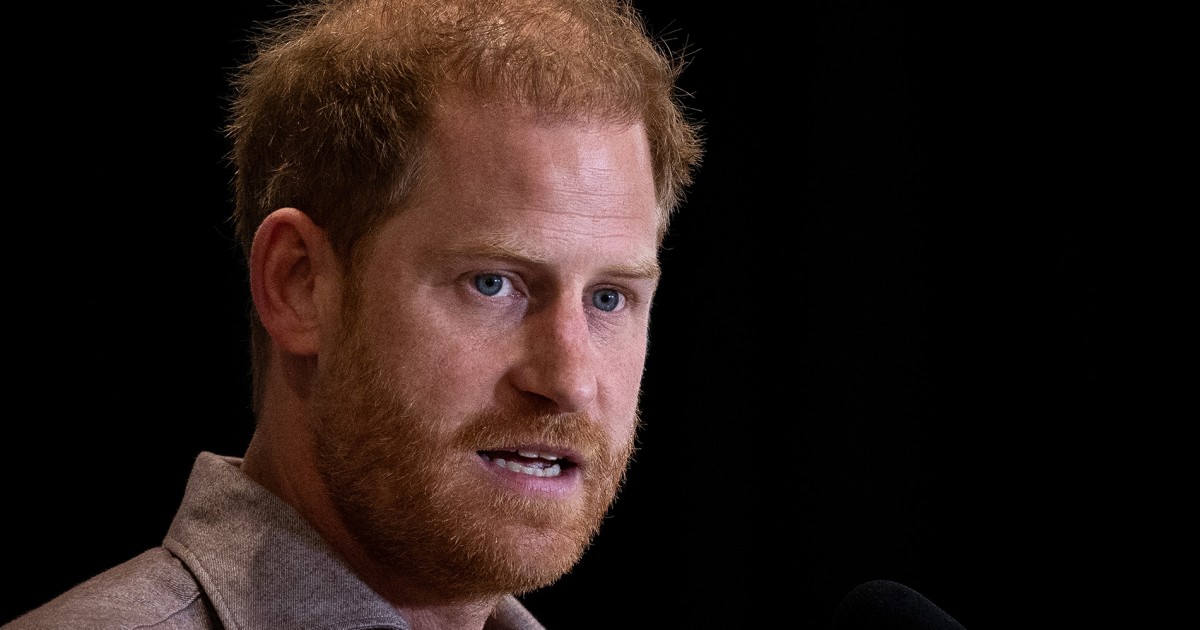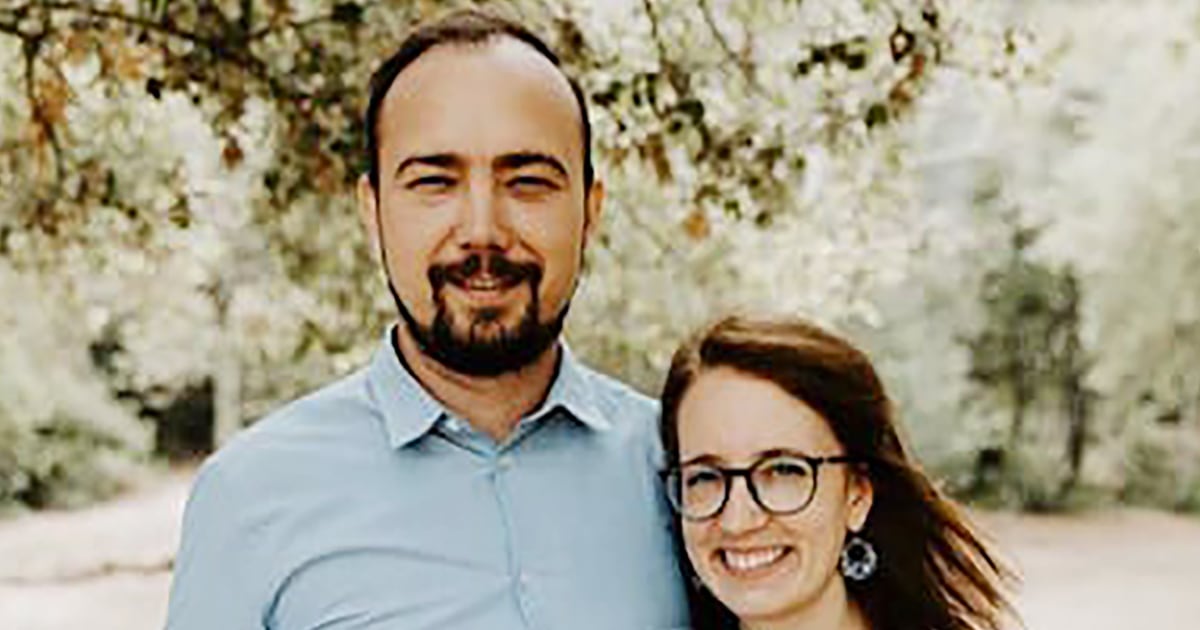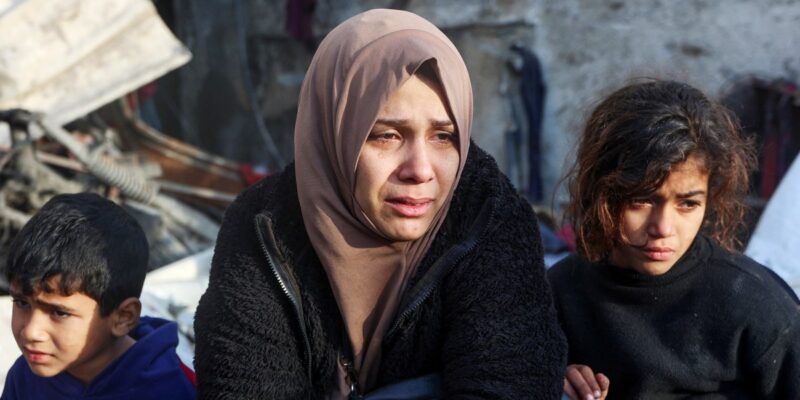
Israel and Hamas appeared to be on the verge of agreeing to a ceasefire deal Wednesday that could end 15 months of devastating fighting in the Gaza Strip, even as the Israel military continued to launch airstrikes in the enclave and families of Israeli hostages begged for their safe return.
American, Egyptian and Qatari delegations have been working to secure a truce to end fighting, with officials familiar with the talks taking place in the Qatari capital of Doha saying that an agreement that would see the gradual release of dozens of hostages in exchange for hundreds of Palestinian prisoners was on the verge of completion.
Israeli Prime Minister Benjamin Netanyahu’s office said that Hamas had not yet responded to the draft agreement, after reports of a breakthrough in Israeli media.
Earlier Wednesday a senior Arab official familiar with negotiations told NBC News that three key points were still being negotiated: the map dictating where exactly Israeli forces will withdraw to, particularly along the Netzarim Corridor that currently splits the Gaza Strip in two; the extent of its withdrawal from the strategic Philadelphi Corridor that flanks Gaza’s southern border with Egypt; and the names of Palestinian prisoners to be exchanged for Hamas’ Oct. 7 captives, as well as the method and location of their release.
Netanyahu’s spokesman, David Mencer, told NBC News on Wednesday that the deal was “awaiting Hamas agreement.”
That comment came after Israeli Foreign Minister Gideon Sa’ar said Tuesday that a majority within Netanyahu’s coalition government would support the “gradual deal” being negotiated.
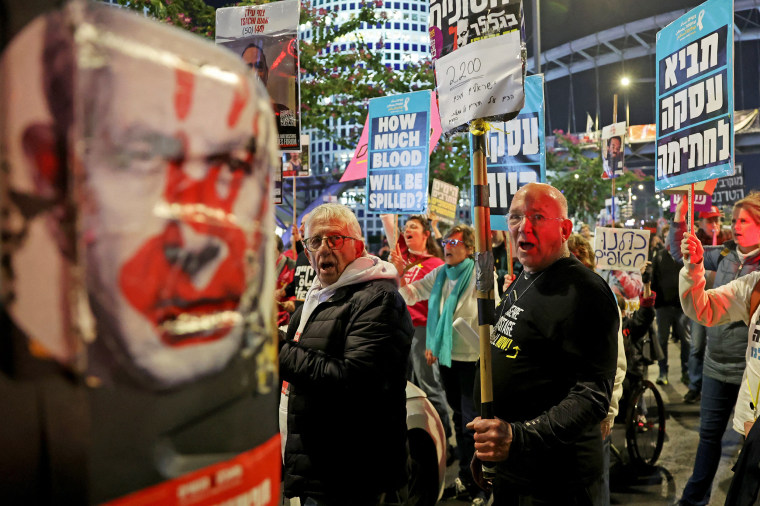
Demonstrators calling for action to secure the release of Israeli hostages held in Gaza, during a protest in Tel Aviv on Tuesday.Jack Guez / AFP – Getty Images
Earlier in the day, a senior Israeli official gave details of the current plans, which involve a 42-day first phase in which 33 hostages, most of whom are believed to be alive, would be exchanged for Palestinian prisoners. That would be followed by a “more complicated” second phase, Sa’ar said.
The official added that the Israel Defense Forces would also withdraw from central Gaza to the Israeli border, but not before the hostages are freed.
Of the 251 hostages kidnapped by Hamas on Oct. 7, 2023, 94 people are still being held in Gaza — 34 of whom have died.
The first 33 hostages, defined as “humanitarian cases,” would be released during the first phase of the deal, a senior Israeli official told reporters Tuesday.
Fighting began in Gaza began on Oct. 7, 2023, when the Palestinian militant group Hamas carried out a terror attack on Israel in which 1,200 people were killed. That saw Israel launch an air and land assault on Gaza, killing more than 46,000 people, most of them civilians, according to local officials.
President Joe Biden said this week that a deal to end the war was “on the brink” of being completed. Washington is looking to secure the deal before President-elect Donald Trump takes office Monday.
Until that happens, though, the violence continues. At least 17 people were killed in Israeli airstrikes on Gaza late Tuesday, according to the enclave’s Health Ministry. A separate Israeli strike on Jenin, in the occupied West Bank, killed at least six people, the ministry said.
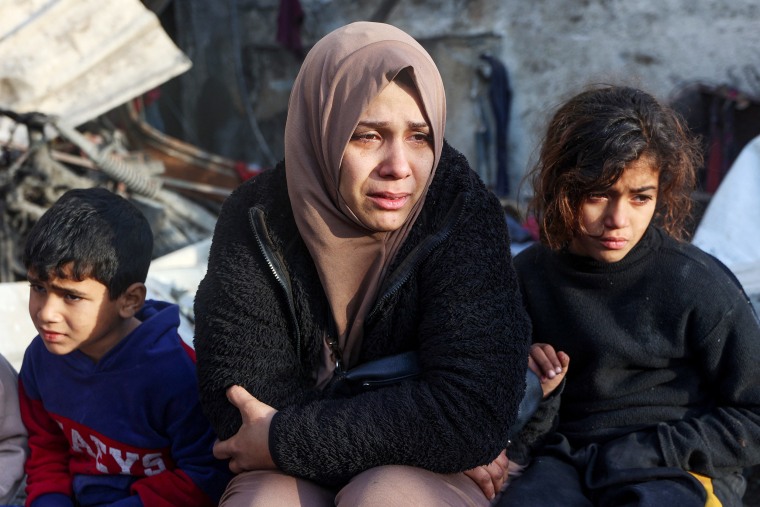
An internally displaced Palestinian woman with her children after an Israeli strike on a school in Gaza City on Wednesday.Omar Al-Qattaa / AFP – Getty Images
The Israeli military said in a statement it had “struck more than 50 terrorist targets across the Gaza Strip, including terrorist cells, weapons storage facilities, underground infrastructure, anti-tank fire positions, and Hamas military structures.”
Alongside the Palestinians desperate for this bombardment to end, Israelis have for months begged their government to bring home their relatives who were kidnapped by Hamas on Oct. 7. They have often been deeply critical of Netanyahu, whom they accuse of prioritizing the war and keeping together his fractious right-wing coalition government over the safety of their loved ones.
As they have throughout this conflict, thousands of people gathered Tuesday night in the Tel Aviv plaza that has in recent months become known as “Hostages Square.” Among them was Moran Stela Yanai, who spent 54 days in captivity after being abducted at the Supernova music festival on the morning of Hamas’ surprise attack.
“I appeal to you, the international community, with a simple yet urgent plea: help us bring the hostages home,” she said, according to a statement from the Hostages and Missing Families Forum.
“This is not about politics—it is about humanity and the shared belief that no one should be left behind in darkness,” she added. “These are children, parents, brothers, and sisters—individuals with dreams, hopes, and loved ones longing for their return.”
The Bibas family said they had read reports that their relatives were among those set to be freed. Yarden Bibas, his wife Shiri and their sons Ariel, 5, and Kfir, 1, were taken from their home in Kibbutz Nir Oz on Oct. 7.
“We have learned from experience and disappointment, and therefore, until our loved ones cross the border, there is no end to the story,” the family said in a statement. “We are waiting for certainty regarding their release and their condition and ask that you do not contact us during this sensitive period.”





